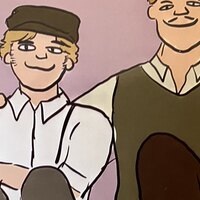Ernst
ObywatelKajen
- Created
- 2 years, 11 months ago
- Creator
- ObywatelKajen
- Favorites
- 2
Profile

Ernst
24 / Male / womanizerAbout
Favorites
- ✦ Romancing women
- ✦ Wine
- ✦ Crime stories
- ✦ Dancing
- ✦ Newspapers
Interests
- ✦ Reading
- ✦ Horse riding
- ✦ Bibliology
- ✦ Fashion
- ✦ Billiards
Dislikes
- ✦ Drunk people
- ✦ Making fun of diastema
- ✦ Germans
- ✦ Classical music
- ✦ Long-term relationships
Notes
Blurb
Ernest Rębacz (born Ernst Hauer) is one of the supporting characters in the story during the 1920s arc of Ballad about Silesia. He was shortly called Ernst by friends. He was born and raised in Bytom with his family, yet ain 1918, they moved to Katowice. In 1920, he rapidly decided to fight in the Second Silesian Uprising, where he met Janusz Dytko and Marcin Niedźwiecki – right after their old companion's, Ewald, death. Ernst was raised in a household keeping Polish traditions and always considered himself a Pole.
Originating from Bytom city, Ernst was born to Anna and Zygfryd Rębacz (Anna and Siegfried Hauer) on July 29th, 1897. He had two younger siblings – Emilia and Edward. The family was close, and the siblings were almost unseperatable. The man is a womanizer, who has lots of short-term relationships or even one-night stands – despite that, he got married with the pretty singer Matylda Pietrek in 1936. They didn't had any children. Ernst, like many other Silesians, held a grudge against Germans for what happened in 1910s and 1920s. He leans into Korfanty's political views. Friend of Janusz Dytko, Marcin Niedźwiecki and Eugeniusz Myśliwski.
Ernst is a man of a difficult personality. Sassy and sarcastic, he isn't the person to simply insult somebody when provoked – he likes to do it, as he says, "with class". That's why hearing him cursing is rare, even during the Uprisings. He knows all the local news and gossips surrounding the city of Katowice – overall, Ernst is quite a smart individual. He is a very committed worker of Radio "Katowice". Ernst's biggest hobby is unprofessional horse riding, he even has a mare named Dakota.
General Trivia
- ✦ Voice claim (Robert Tondera) / Theme song.
- ✦ Ernst flirts with men sometimes too – he doesn't label himself though.
- ✦ He is very good at dancing, from folk dances to more serious ones.
- ✦ Ernst hates cucumber soup with burning passion.
- ✦ He often gifts Tilda with small things if he only can.
Aesthetic






History
Early life
Ernst Hauer was born on July 29th, 1897 to Anna and Siegfried Hauer (Anna and Zygfryd Rębacz) in Bytom as their first child. He had two younger siblings – Emilia (b. 1902) and Edward (b. 1902), for who the boy greatly cared, especially Emilia. As many others, Ernst's household tried to keep and celebrate the Polish traditions despite Poland not existing back then. Ernst was always a smart kid and had relativly small problems in school, besides German and mathematics – he always struggled with math, no matter how long he would study. As an older kid, he worked as a paperboy, deliviering newspapers to his neighbours. That was the first time he would dream of working for the newspaper or the radio, hoping it'll become true someday. In 1918, Ernst moved with his family to Katowice, where they lived in one house in Załęże, where he helped his mother keep the house along with his siblings. When the first Silesian Uprising broke out in 1919, the man has begged his mother to let him go fight. In the end, she agreed and he left the house to fight. The uprising has, however, failed and Ernst came back home defeated, having to face distrust from some people – notably German citizens of Katowice. It filled him with sadness and rage at the same time, and that's why he decided to fight in the second Silesian Uprising; this time his mother let him fight without any words. It broke out in August 1920.
1920s
This is the time he met Janusz Dytko and Marcin Niedźwiecki, right after Ewald was killed by one of Germans – they fought in one regiment. Marcin was wary towards Ernst, as he thought "it was replacing Ewald" – Hanik, however, instantly caught common ground with the man. This uprising, like the one before, has failed too, and Ernst had to face what he has feared the most – deriding and distrust from other citizens of the city. Of course, he knew people who had exactly the same views on where Silesia belongs, but their stares... he couldn't stand that. In 1921, the Third Silesian Uprising broke out and at Hanik's suggestion, he and Marcin decided to fight once more. The three fought in the Battle of Annaberg, where they met Eugeniusz Myśliwski and Emil Zimowicz – Gynek came back with them to Katowice, as the boy had nowhere to go. Ernst voted for Poland in the plebiscite, and in 1922 their long-awaited wish became real. After Radio "Katowice" was established, he joined and became a radio host. In the late 1920s, Ernst started dating Matylda "Tilda" Peitrek – popular in this area singer, singing songs both in Polish and German. He often hanged out with his friends, mostly in Giszowiec.
1930s & after the war
In 1934, Ernst and Tilda got engaged, and then married two years later; they ever had any children. Due to his resistance against Germans in 1920s, when Third Reich invaded Poland, Ernst got killed by Nazis in early days of September 1939. He got executed by hanging along with his friends, Hanik and Marcin, to show what happens with those who try to resist. After war, his name got put on Silesian Insurgents Memorial in Katowice, Poland and is here to this day. Through late 1940s and in 1950s, he was brought up by Ojgen, Gustlik or other older residents of after-war Giszowiec sometimes. Ojgen has dedicated one of his paintings to his uprising comrades who didn't manage to survive the war.
Relationships

Hanik Husband
Hanik is her husband. They met in 1917, when she came out of the house to scold Hanik and his friends picking apples from a tree on Ambrozs' property. They love each other deeply and care for one another a lot. Despite being a housewife, Hanik never forced his wife to do anything and doesn't have any problem with her voicing her opinion and views – much to surprise of some his friends.

Marcin Friend
They aren't close, but get along. Before they went to fight for Poland, Lynka told Marcin – jokingly or not – to take care of Hanik for her. Of course, Marcin did it.

Tilda Friend
They're close friends thanks to the fact that Ernest – who's Tilda's fiancé – is a friend of Hanik, Lynka's husband. In fact, that's how they met. They often meet and chat while drinking tea or coffee. Lynka has promised Tilda that when she'll have her children, Lynka will try to help her as best as she can – sadly, this never came true.

Alina Friend
Alina and Lynka are friends, albeit they don't talk that much due to the fact that Alina lives near Opole. They met after the Third Silesian Uprising, and they instantly caught common ground. They like to spend time in each other's company. They have similar personalities.
Personality
Personality
Ernst is a man of a difficult personality. Sassy and sarcastic, he isn't the person to simply insult somebody when provoked – he likes to do it, as he says, "with class", thinking of some high-flown way of insulting another person. That's why hearing him cursing is rare, even during the Uprisings – he starts doing it only after he's stressed. And that doesn't happen often. The man is impulsive as well, so when he shares his ideas with Hanik... they're deifinitely up to no good. He's creative and tries to be original when coming up with the ideas – he always has something planned, whebever it's something for work or in his personal life. He is an extrovert, who has no problems in making friends in new environment. He often has small, friendly arguments with his friends; calling them jockingly "morons" is common for him.
Ernst can't stand any mess in his workplace, and everything has to be in its place, otherwise he can't focus. Certainly can be called neat freak, as he has the habit of cleaning things multiple times. If he has a bad day, even a pen lying in the wrong place can irritate him. Ernst would rather be the leader of the group project, and likes to get the work done in 100%. As Ernst leans into Korfanty's political views, he really dislikes Germans. He and Erwin Ziegler didn't get along for a long time because of the man's bias towards Germans; along with Hanik they often made fun of the new Giszowiec resident.
He knows all the local news and gossips surrounding the city of Katowice – overall, Ernst is quite a smart individual. He is a very committed worker of Radio "Katowice". His biggest hobby is unprofessional horse riding, he even has a mare named Dakota; he thinks that horses are great companions and understand him better than any other human.





